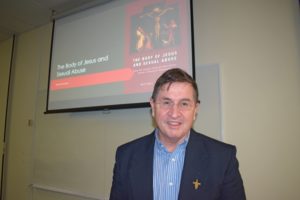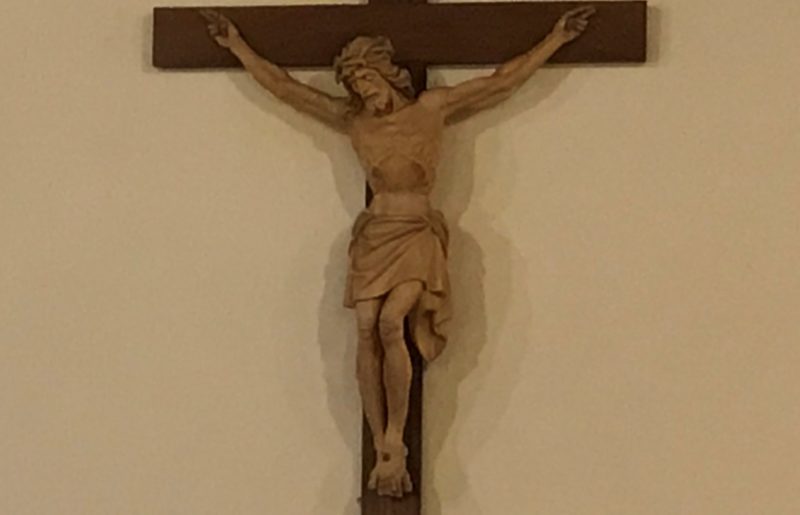Australian theologian Rev. Dr Michael Trainor has proposed that a pastoral way to help victims of sexual abuse can begin by looking closely at Jesus’ crucifixion and death and realising that Jesus identifies with the victims rather than the other way around.

Rev Dr Michael Trainor
Speaking at a symposium called “The Body of Jesus and Sexual Abuse” at Holy Cross Seminary on April 27, Fr Trainor said Christians have become so used to spiritualising the Gospel stories and glossing over the passion and death to emphasise the Resurrection that “we’ve lost their corporeal power, the power of the body”.
“What I want to suggest is the story of Jesus, in the Gospels generally and particularly in Mark’s, is a story of sexual abuse of Jesus.”
Fr Trainor, author of The Body of Jesus and Sexual Abuse: How the Gospel Passion Narratives inform a Pastoral Response, explained that Mark was writing for a community that had been struggling, lonely and misunderstood.
He said Mark painted a portrait of Jesus, at the point of death, who was misunderstood, alone and who cried out, “My God, my God, why have you abandoned me?”.
“I think the experience of divine abandonment undergirds the story of this Jesus who connects to a community or household followers who feel divinely abandoned,” he said.
In Mark’s Gospel, Fr Trainor pointed out that the first sign of betrayal was an act of intimacy, which was Judas’ kiss.
Jesus was then humiliated, mocked, beaten and stripped of his clothes. Fr Trainor explained the act of being stripped of clothes was an act of sexual shaming.
“In [Mark’s] narrative, Jesus is naked. It is to emphasise again for the victim and for Mark’s Jesus, the utter shame which [Jesus] takes on for his action. So, [Jesus] is a victim of sexual abuse,” he said.
Mark, Fr Trainor reiterated, offered the insight that what Jesus experienced speaks to the experience of the abused.
“It is not to be abused to become like Jesus, it’s Jesus who becomes like the abused. It up-ends the conventional way that we see this,” he said.
The second point that emerges from Mark’s account of the passion and death is the experience of the divine absence and Jesus crying out to God about abandonment.
“And I think this is the radical nature of Mark’s dying Jesus. Mark’s Jesus gives permission to voice the difficulty, the sadness and the tragedy that follows Jesus,” he said.
“God accompanies all people who are suffering, who are struggling, whatever their situation. And he delivers not by taking away the suffering [but] by giving the opportunity to voice the suffering,” he explained.
Fr Trainor, who is based in Adelaide, said this links to another divine absence in the Easter story where the angel told the women, “He has been raised. He is not here”.
“Somehow Mark is linking the story of Jesus absent of the Father in the death scene with the absence of the divine presence in the tomb. And that’s connected to the experience of Resurrection,” he said.
“I think it’s saying like in those experiences of divine absence, which is what survivors of sexual abuse experience, somehow, there is a ground for the experience of God which is the Resurrection.”
The third point, Fr Trainor said, is that God laments.
“We are invited to lament with all who suffer and are experiencing this,” he said.
Royal Commission
Fr Trainor said when the Royal Commission into Institutional Responses to Child Sexual Abuse in Australia launched its inquiry, what became clear to him was “our Church was actually putting a blind face to it and the Royal Commission really enabled issues to surface and people to speak and tell their stories”.
Of the survivors of abuse in a religious institution who told their stories to the Royal Commission , 61.8 per cent were Catholic.
He said that made him reflect on the cultural and institutional practices of the Church in Australia.
He said the episcopal structure of the Church needed to become transparent and inclusive.
“There’s an issue in our Church in Australia that has to do with clericalism. When you are a seminarian and when you are ordained, there’s a kid of preferential treatment for ‘father’. It’s a culture we have. It therefore gives ‘father’ power. And I’d been ordained, so I am sacral,” he said.
This practice tended to forget about the sacrament of Baptism as a call to ministry. “I think we need to reclaim, for us as Catholics, this centrepiece of Baptism,” he said.
He also said there is a need to look at the role of women in the Church. “It is important for us in the Church not only to talk about the role of women in the Church but to demonstrate that women are integral in the leadership of our Church. How we do that is an important conversation we need to have across the board,” he said.

[…] connection. In my own work, and writings by Elaine Heath, Rev Wil Gafney and Australian theologian Rev Michael Trainor, it is argued that Jesus does not just share theologically in the abuse, but that he himself […]